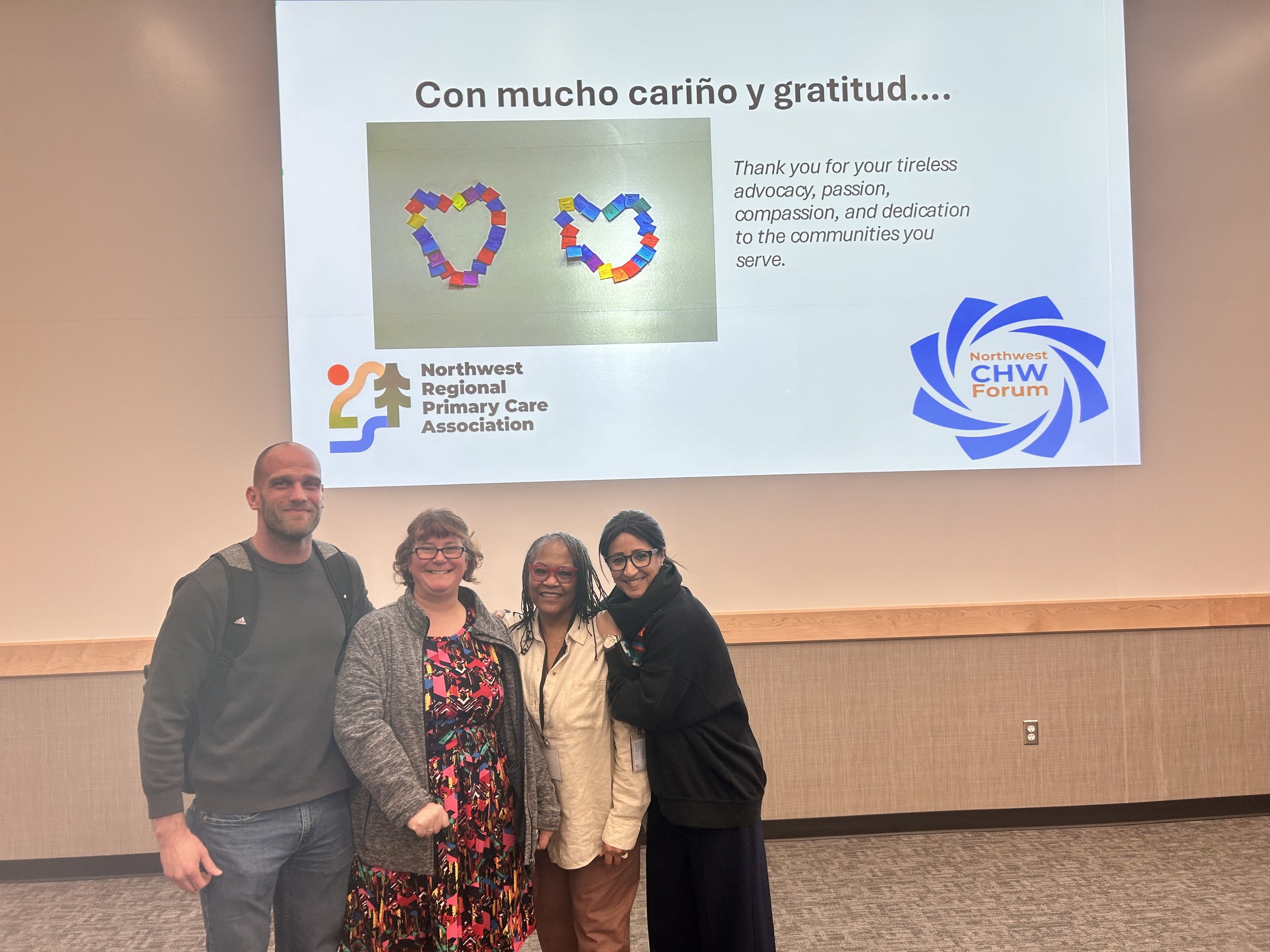Reflections from the Northwest Community Health Worker Forum
/bht staff: Ryan, Kim, Adell, and Hadda
Early this April, BHT team members Kim Wilson (Community-based Workforce Program Manager), Adell Whitehead (Training Manager), Ryan Douse (Community Engagement Program Manager), and Hadda Estrada (EVP of Strategy and Community Voice) attended the first-ever Northwest Community Health Worker (CHW) Forum. The event was hosted by the Northwest Regional Primary Care Association and brought together CHWs and supporters from across Washington, Oregon, Idaho, Alaska, and other areas. It was a space for people to connect, reflect, and recharge around the important work CHWs do for their communities.
One thing that made this forum special, as Hadda shared, was that CHWs were not just invited—they were the focus. Their experiences, leadership, and knowledge shaped the entire event. CHWs were the ones leading conversations while everyone else had the chance to learn and listen.
Read on for some key themes and reflections that our team shared from their experience at the forum!
Reconnecting and Recharging
Kim talked about how powerful it was to be surrounded by other CHWs. “It was great to see my CHW peeps. Lots of hugs, lots of heart. This forum felt different from others. It was more personal and more focused on community.” For Kim, the biggest message was that CHWs are not just helpers. They are leaders who deserve good pay, professional development, mental health support, and workplaces that care about their well-being.
Making Care Truly Safe
Adell shared how much the Safe Care session meant to her. It focused on creating safe and healing spaces where people feel seen and respected. Adell left inspired to bring what she learned into the CHW trainings she leads. She is now building in simple self-care practices like breathing, drinking water, and taking a short break between client visits. “Even five minutes can make a difference,” she said.
She also spoke about a challenge many CHWs face. “They give so much of themselves, but the systems they work in often don’t give the same support back” shared Adell. She hopes more supervisors can understand the emotional side of CHW work and be trained to support their teams better.
Rest is Needed
Many CHWs work long hours and go beyond clinics to reach people where they are—whether that’s at camps, homes, or shelters. They take phone calls after hours and often don’t stop when the workday ends. At the forum, participants created personal self-care plans to help manage stress and avoid burnout.
Hadda shared that what really helps CHWs stay strong is not just planning or tools—it’s connection. Things like sharing meals, laughing, storytelling, and cultural traditions like “cafecito y chisme” help CHWs feel supported. These moments are not just nice extras. They are powerful ways to build strength and care for each other as a community.
Shared Challenges, Collective Strength
Ryan noticed that even though CHWs came from many different places, they talked about many of the same struggles. Issues like housing, federal policy changes, and lack of funding affect CHWs everywhere. One of Ryan’s favorite parts was a session where CHWs could talk honestly and be heard. Sometimes just having space to speak is what matters most.
He also highlighted the CHW Sustainability panel. It brought together people from different roles and organizations to talk about how to support CHWs in the long term. The message was clear: we can’t just rely on CHWs to do the work. We need systems that are built with them in mind.
Community Health Workers as Experts
Another session that stood out was led by Noel Wiggins from the CHW Center for Research and Evaluation. It showed that CHWs are not just workers—they are researchers and leaders. They have important knowledge and should be included when programs are being planned and reviewed. Many CHWs want to help shape programs and research. But they are often not given updates or a seat at the table after they give feedback. Across the forum, there was a strong call for change. People agreed that CHWs need more than support. They need the tools, resources, and decision-making power to help build the systems they are a part of.
With Deep Gratitude
Better Health Together was thankful to take part in the CHW Sustainability panel during the final day of the forum. We were proud to join our fellow ACHs Greater Health Now, HealthierHere, and the CHW Institute at NWRPCA to talk about how to better support and advocate for CHWs. These conversations are important, and we were honored to be included.
We also want to sincerely thank the Northwest Regional Primary Care Association for hosting the forum, and all the sponsors who helped make it possible. It takes a lot of work to create a space where CHWs feel seen and supported. We are grateful for everyone who made that happen. To every CHW, event organizer, and partner who was part of the forum thank you. You are building a healthier, more connected future for all of us, and we are proud to walk alongside you!


